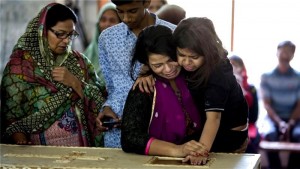Suicide bomb attack against innocent people in Pakistan, is a heinous crime, says CCA General Secretary.
[caption id="attachment_1718" align="aligncenter" width="559"] Photo Source: AlJazeera[/caption]
Photo Source: AlJazeera[/caption]
“Suicide bomb attack on innocent people, mostly women and children in Lahore, by terrorist groups, is a heinous crime” said Dr. Mathews George Chunakara, General Secretary, Christian Conference of Asia.
In reaction to the news of a suicide bomber killing more than 70 people and injuring 300 others at the Gulshan-e-Iqbal Park in Lahore on Easter Sunday, the CCA General Secretary stated that CCA was deeply shocked and saddened to receive the news and further dismayed to learn from ecumenical colleagues in Pakistan, that the deadly suicide attack on Easter evening caused untold suffering for many people while several families from predominantly Christian settlements in Youhanabad and Bahar Colony areas were spending time with their children in the park, after Easter services in churches.
In a pastoral solidarity letter sent on behalf of CCA to the National Council of Churches in Pakistan and other member churches of CCA in Pakistan, CCA General Secretary wrote that "it was unfortunate that sectarian violence and blatant terrorism was continuously taking place in Pakistani society due to widespread religious hatred against Christian minorities."
He added that "such cowardly actions destroys the very core of the social fabric and communal harmony in the country."
"The increasing trend of attacks against innocent people raises questions over the security measures by the government to protect the lives of its citizens.”
He appealed to the government of Pakistan to prevent these savage inhuman actions from over-running the lives of people who have every right to live in peace, security and freedom of movement.
Recalling the suicide attacks carried out in 2013 at All Saints Church in Peshawar’s Kohati Gate area, killing 80 and wounding hundreds as well as other suicide bombings at two churches in Youhanabad area in March 2015, the CCA General Secretary raised the concern of the plight of Christian minority in Pakistan who are constantly facing deadly attacks, while the perpetrators continue with impunity.
Dr. Mathews George was of the opinion that these incidents are clear indications of the vulnerable situations in which Christians in Pakistan are forced to live.
Expressing solidarity of CCA member churches and councils in Asia at their time of grief, CCA General Secretary wrote “Our thoughts and our prayers are with the people and communities affected by this tragedy” and added that "CCA conveys profound sorrow and condolences to the bereaved families whose loved ones were killed and injured during the blast."
CCA urges all member churches and councils to pray for the comfort and solace of numerous victims irrespective of their religion or faith.
(The full text of the letter of solidarity is available here)










